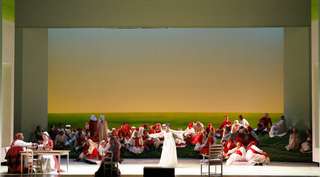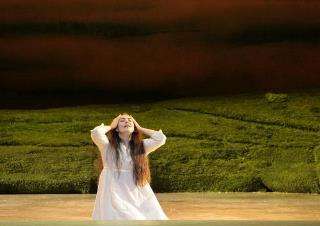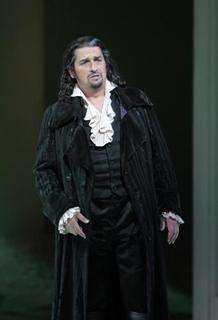|
Back
A Refreshing New Cast Los Angeles
Dorothy Chandler Pavilion
09/17/2011 - and September 21, 25, October 1, 6, 9, 2011
Pyotr Ilyich Tchaikovsky: Eugene Onegin
Dalibor Jenis (Eugene Onegin), Oksana Dyka (Tatiana), Vsevolod Grivnov (Vladimir Lensky), Ekaterina Semenchuk (Olga Larina), James Creswell (Prince Gremin), Margaret Thompson (Madame Larina), Ronnita Nicole Miller (Filipievna), Keith Jameson (Monsieur Triquet), Philip Cokorinos (Zaretsky), Erik Anstine (A Captain), Todd Strange (A Peasant)
Los Angeles Opera Orchestra and Chorus, Roberto Cani (Concertmaster), Grant Gershon (Assistant Conductor/Chorus Master), James Conlon (Conductor)
Francesca Gilpin (Director), Steven Pimlott (Original Production), Antony McDonald (Scenery and Costume Designer), Peter Mumford (Lighting Designer), Ulrika Hallberg (Choreographer), Linda Dobell (Original Choreographer)

(© Robert Millard)
Los Angeles Opera opens its 2011-2012 season with the company premier of Pyotr Tchaikovsky’s Eugene Onegin featuring a cadre of new faces. The infusion of new blood is refreshing, hinting restorative conservative measures since the 2010 Ring Cycle’s $ 32 million drain.
Leann Davis Alspaugh defines the approach to Eugene Onegin as, “Tchaikovsky aims to achieve something similar by focusing on how two of society’s most mundane activities, letter-writing and dancing, can be used to illuminate character.” Francesca Gilpin’s earlier staging success of The Turn of the Screw is in gaping contrast to her Eugene Onegin which merits greater discussion. The production’s quality moments are recherché, missing splendid opportunities to detail the anthropological mores from the 1820s. Collectively, all cast members deliver solid performances, but they are altogether periodically hampered by sets and choreography.

(© Robert Millard)
The strongest vocal deliveries come from Oksana Dyka and James Creswell. Dyka credibly transforms Tatiana from a shy, bookish young girl with a soon-to-be adolescent infatuation into a blossomed mature, dignified and honorable woman. The native Ukranian nicely commingles Russian textural intricacies alongside a voice searing with sharp and distinct radiance. Her “Letter Aria” is poignant and captivating, although she oddly spends more time writing on the floor instead of her bed. James Creswell, the brimming baronial bass, demonstrates philosophies of love and life with hypnotizing and masculine flair during the aria, “Lyubvi vsye vozrasti pokorni.” It is sublime.

(© Robert Millard)
While Dalibor Jenis’ full-bodied, arrogant baritone voice makes him a fitting Eugene Onegin, his interpretative qualities are a tad shallow and static. Nonetheless, he abruptly hits his stride in the closing scene with a bang. Vsevolod Grivnov’s LA Opera debut as Lensky carries a clarion yet occasionally strident voice that’s sufficiently pleasing as he sings his Act I aria, “Ya lyublyu vas” to the flighty Olga assigned to Ekaterina Semenchuk. Margaret Thompson delivers a rock solid performance as Madame Larina while Ronnita Nicole Miller’s Filipievna personifies comfort, peace and stability which is pleasingly supported by her smoky and nurturing mezzo voice. Likewise, Keith Jameson as Monsieur Triquet retains a beautiful timbre and Philip Cokorinos’ Zaretsky, replete with a broadened bass-baritone voice, captivates the female revelers in Act II.
Each of the seven scenes features a scrim of a nude man or woman, the first being Hippolyte Flandrin’s 1855 “Young Male Nude” which has no intrinsic relevancy to the opera. Operationally, the scrim snags twice while being raised, then slams to the floor. Fortunately, James Conlon remains unfazed.
The most striking set in Act I features a pale blue sky with a chartreuse field that nicely contrasts with Antony McDonald’s colorful antiseptic red and white costuming. Urika Hallberg’s khorovod peasant dance in Act I is not true in form, perhaps due to encroachment of a water pond. What lacks in choreography is enhanced through dress.
Known for ballet music, Pyotr Tchaikovsky again places heavy emphasis on the dance to heighten cultural events within the two social classes and as a vehicle to move along the plot. Four major dance pieces exist in Eugene Onegin, yet Hallberg’s movements are disruptive and dishonoring: Tatiana’s name-day party in Act II is claustrophobically housed in a slivered front stage, blurring any vestiges of a waltz (and forthcoming mazurka) while simultaneously losing focus on the ensuing flare-up between Onegin and Lensky. The first section of Tchaikovsky’s polonaise is played with a closed curtain that later opens to an outdoor winter scene. As chorus members move onstage in slow motion towards an ice skating rink, the polonaise’s final bars have the corps’ backs turned to the audience. For a handful of minutes ice skaters move about during the écossaise lacking any cohesive rhythmic connection. In summary, these translations are incongruous and lack any formal Russian protocol.
Perhaps the best part of this Eugene Onegin, however, lies within the pit. James Conlon conducts with passion, wringing out every ounce of musical texture found within the orchestra. This is a five star delivery.
Christie Grimstad
|